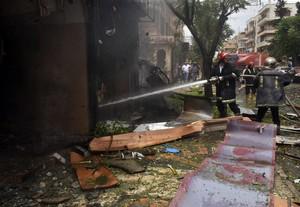Syria Targeting of Syrian healthcare as “weapon of war” sets dangerous precedent: Experts
The strategy of using people’s need for healthcare against them by violently denying access sets a dangerous precedent that the global health community must urgently address, researchers say. As new estimates of death toll for health workers are published, experts say the deliberate and systematic attacks on the healthcare infrastructure in Syria – primarily by government forces – expose shortcomings in international responses to health needs in conflict.

A bombed hospital in Aleppo // Source: theconversation.com
The strategy of using people’s need for healthcare against them by violently denying access sets a dangerous precedent that the global health community must urgently address, say an international team of researchers.
The authors of a new report published 15 March in The Lancet – marking six years since the conflict began – have “triangulated” various data sources to provide new estimates for the number of medical personnel killed so far: 814 from March 2011 to February 2017. However, they also say this is likely to be a “gross underestimate” due to limitations of evidence-gathering and corroboration in the conflict areas.
There were 199 attacks on health facilities in 2016 alone – an increase from 91 in 2012, when the Syrian government effectively criminalized medical aid for the opposition. The government and its allies, including Russia, have been responsible for at least 94% of attacks, say the experts – threatening the foundation of medical neutrality.
Besieged areas are denied medicine, and remaining medics are delivering what care they can in brutal conditions. Despite explicit protections under International Humanitarian Law, attacks on health workers have included imprisonment, abduction, torture and execution.
Cambridge University notes that the authors of the latest report, including researchers from Cambridge’s departments of sociology and politics, say the conflict has exposed serious shortcomings in global governance.
They call for the systematic documentation of attacks on health workers and, critically, the perpetrators via the WHO, allowing for greater accountability. UN policies and practices should also be reviewed and strengthened, including operational capacity to deliver support to health workers across conflict lines.
The research team also calls for global solidarity with health workers in the Syrian conflict, including support to increase awareness among donors and politicians.
“Syria has become one of the most dangerous places on earth to be a healthcare worker,” says Dr. Adam Coutts, report co-author from Cambridge’s Department of Sociology.
“Thousands of health workers have left and relocated to neighboring countries and further afield such as Europe. This poses significant challenges for current healthcare provision in Syria but also for future health system rebuilding in a post conflict situation.”
Between 2011 and 2015, it is estimated that 15000 doctors, or half of the pre-war numbers, left the country. In Eastern Aleppo, approximately 1 doctor remained for every 7000 residents, compared with 1 in 800 in 2010.
